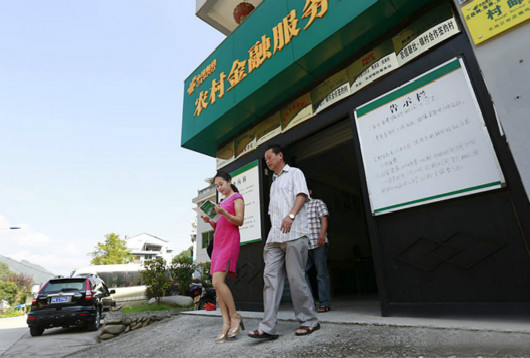
. > TOP STORIES
China's Central Document prioritizes development of agriculture,rural areas
Author : Zhang Jie Source : Chinese Social Sciences Today 2019-03-11

A rural financial services office in Hexi Town,Jingning County,Zhejiang Province Photeo:XINHUA
The CPC Central Committee and State Council pledged in the recently released No. 1 Central Document to implement the general guidelines for prioritizing the development of agriculture and rural areas and firmly establish a policy orientation for this.
“Prioritizing the development of agriculture and rural areas is the focus of the No. 1 Central Document this year,” said Kong Xiangzhi, a professor from the School of Agricultural Economics and Rural Development at Renmin University of China. Essentially, this means prioritizing agriculture and rural areas in capital investment, industrial layout, employment, infrastructure construction, public services and so on, gradually correcting the imbalance between urban and rural areas before finally achieving balanced development. As such, it can be affirmed that in the long-term future, prioritizing the development of agriculture and rural areas will be the basis for China’s agricultural and rural policies.
Since the reform and opening up, the relationship between China’s urban and rural areas first evolved from agriculture supporting industry to industry nurturing agriculture along with urban areas supporting rural areas; they then moved from integrated urban-rural development to prioritizing the development of agriculture and rural areas, said Wang Xingguo, deputy secretary of the Party Committee of the Shandong Academy of Social Sciences. This not only reflects the continuity of the central policy, but also meets the characteristics and specific requirements of this stage in the new era.
Wang said that in order to implement the general policy of giving priority to agricultural and rural development, the document highlights four policy priorities. First, it highlights training professional rural service personnel. Second, it prioritizes facilitating the allocation of development factors for agriculture, rural areas and rural people, resolutely removing barriers to institutional mechanisms that impede the free flow and equal exchange of urban and rural elements and comprehensively activating various resources in rural areas.
Third, it prioritizes ensuring the investment in agriculture, rural areas and rural people and the maintenance of agriculture and rural areas as a priority area for financial protection and for financial services. A greater proportion of public finances are given to agriculture, rural areas and rural people. The fourth is to prioritize rural public services, unify basic urban and rural public service standards, and integrate their systems.
“To implement the policy of prioritizing the development of agriculture and rural areas, it is imperative to deepen reform to provide institutional supply and support,” said Cheng Guoqiang, a professor from Tongji University’s School of Economics and Management.
The next step is to deepen reforms in several respects, Cheng said. It is necessary to advance reform of the rural land system, improving the property rights system and ensuring the market-based allocation of factors of production. In addition, we must deepen the supply-side structural reform of agriculture by focusing on fostering new drivers of growth for agriculture and rural areas.
We must accelerate the construction of a new policy system to support agriculture with the focus on strengthening the high-quality green growth of agriculture, Cheng continued. It is important to facilitate the role of a market-based mechanism and promote the reform of the subsidy mechanism, storage system and the price formation mechanism of important agricultural products. In addition, Cheng continued, we must innovate rural financial services to facilitate finances in rural areas.
Focusing on the major tasks identified in the implementation of the rural vitalization strategy, Wang said that it is necessary to promote the reform of the rural fiscal support system, rationally determine the key points of government support and protection, and clarify the responsibilities of central and local expenditure.
Efforts need be made to broaden the channels for fundraising, adjust and improve the use of land transfer income, and further increase the proportion of inputs in agriculture and rural areas, Wang concluded.
Ye Shengtao made Chinese fairy tales from a wilderness
Ye Shengtao (1894–1988) created the first collection of fairy tales in the history of Chinese children’s literature...
-
How northern ethnicities integrated into Chinese nation
2023-09-18
-
Mogao caves
2023-09-12
-
Mogao Grottoes as ‘a place of pilgrimage’
2023-09-12
-
Time-honored architectural traditions in China
2023-08-29
-
Disentangling the civilizational evolution of China
2023-08-28
-
AI ethics in science fiction
2023-08-23













 2011-2013 by www.cssn.cn. All Rights Reserved
2011-2013 by www.cssn.cn. All Rights Reserved